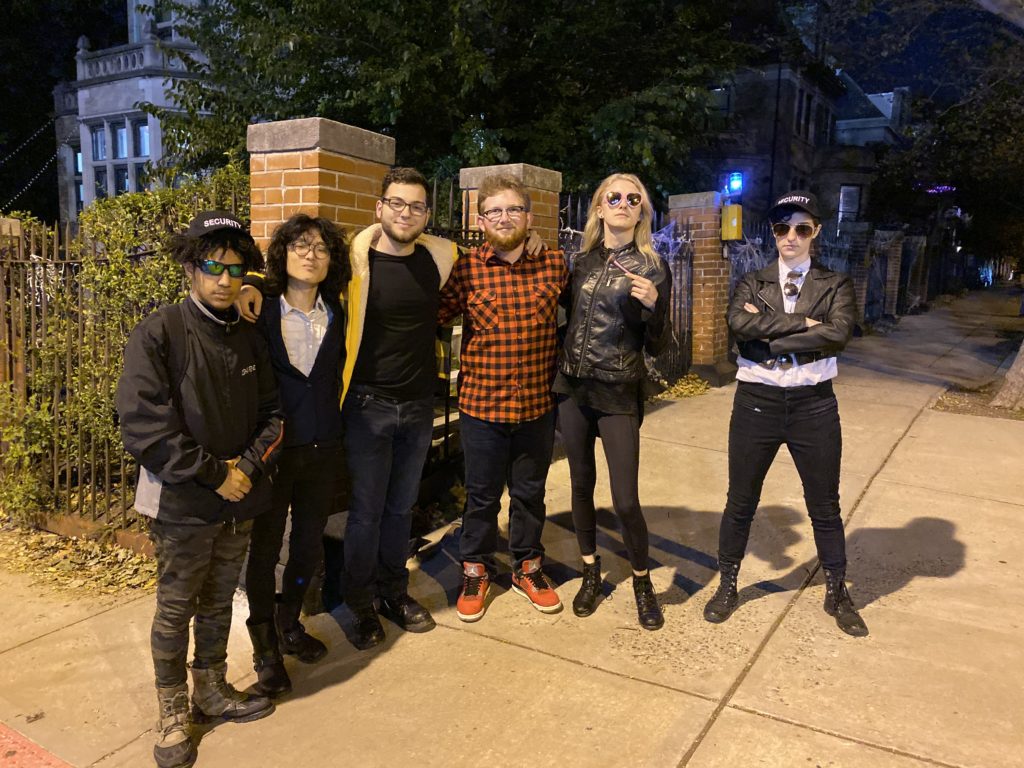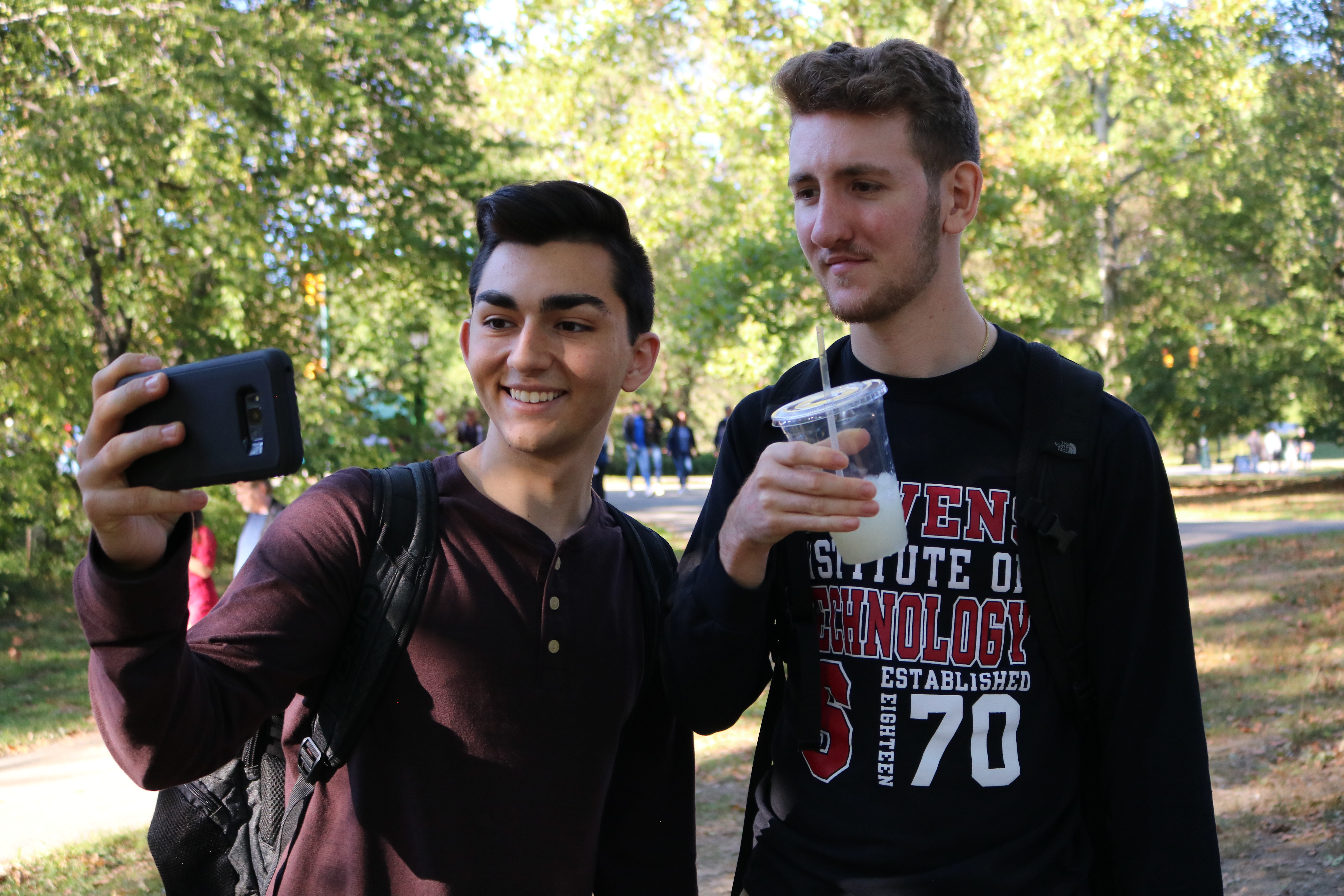Mental Health on Campus
E.J. Hannah and Jason Buckman
“There’s room for improvement on what Stevens accomplishes in terms of both mental health awareness and education,” said Hannah. Stevens currently focuses on programming, but does not focus on ensuring proper education is given to students, faculty, and staff. The senate is currently working on initiatives to improve mental health education and destigmatize it. Current events are good, but there needs to be a greater focus on those who aren’t involved. “There needs to be a greater outlet for people to go to,” said Buckman.
According to Buckman, some students do not feel comfortable with going to CAPS as they are concerned CAPS cannot help them. In general, CAPS needs better PR, and a better perception on campus.
One part of their platform is the instatement of faculty modules on mental health, which had been previously promised by the Office of the Provost.
Brandon Seidman and Simon Pepa
Mental health is a serious topic and definitely needs improvements. Seidman and Pepa are “not fucking around with it.”

Samanta Molla and Adrian Castellanos
“I definitely think it could be handled a lot better,” said Molla. Though the President’s Task Force on Mental Health has been formed, there has not yet been a report to the students on its actions. “The year before me and Adrian were on campus, there were six suicides,” said Molla, “and that is really hard to hear and a lot of students on this campus may not know about that right now. I understand why, as the school doesn’t want to give off a negative image.” Everyone — students, faculty, and staff — should notice small signs such as changes in GPA or involvement that cause people to become distant on campus.
Molla wants to see what the Task Force is working on. “I don’t want to report a concern all the time as that may or may not do anything,” said Molla. Faculty need to report when a student misses class, but professors do not start a conversation with students directly.
“We are a stigma-free campus on paper, but in practice we aren’t anywhere near what we say we are and that’s very unfortunate,” said Castellanos, “Because if we really were a stigma-free campus, CAPS would be able to do so much more. There would be so much more done, and we’d be able to have these conversations so much easier.” CAPS is taking a step in the right direction, but not every student is comfortable reaching out to CAPS.
Construction Inconveniences
E.J. Hannah and Jason Buckman
“There’s not much we can do,” said Buckman. They recognize that construction will happen regardless of student opinion: “We are just a part of Stevens history,” said Hannah.
Instead, students should be made more comfortable with the changes. For example, ResEd could hand out care packages with information about the construction. There needs to be increased communication and consistency on projects as there are numerous instances of constructions workers starting too early, or working too late — and this has not been addressed by anyone.
They also want to make the remaining areas of campus more-lively — such as by adding murals. People need to feel comfortable on campus so that they can relax. “[The construction] makes me feel like a lab rat,” said Hannah.
Brandon Seidman and Simon Pepa
Seidman and Pepa believe there is not enough construction on campus and want to increase its presence.
Samanta Molla and Adrian Castellanos
“There has to be sacrifice for progress,” said Castellanos. Even though student comfort is sacrificed for the future, we need victories on campus to make our campus feel like home. There need to be things right now for students. They want to pursue murals on the fencing of the construction zones to help brighten the days of passersby.
Sustainability
E.J. Hannah and Jason Buckman
A pillar of their campaign platform is sustainability. Hannah and Buckman aim to promote the composting of food waste from Pierce Dining Hall. They recognize this would be a cultural shift and would take a fair amount of time to implement. They want to instill this culture with the freshmen inside Pierce, then have it roll out to fraternity and sorority housing. They also propose a bike rental system to help students living in Hoboken. Positive conversations have already begun with Kenneth Nilsen and the transportation department on a bike rental system.
Additionally, they want to encourage the use of public transportation for Stevens students. The Stevens discount from NJ Transit needs better publicity and discussions are in process for a Lime scooter student discount. There is no discount for the PATH, but Hannah would like the administration to subsidize the PATH to facilitate travel into the city. Hannah added that many administrators have expressed their support as it would decrease the density of cars on campus.
Brandon Seidman and Simon Pepa
Seidman and Pepa want to increase the use of solar energy on campus, while decreasing the use of wind energy on campus because windmills make people dizzy.
Samanta Molla and Adrian Castellanos
Molla and Castellanos want to start a Sustainability Committee within the SGA after trialing sustainability initiatives in the existing Campus Life Committee. This is particularly important due to the many ongoing construction zones on campus. Key implementations of new initiatives include keeping campus generally cleaner, finalizing the campus smoking ban, adopting dual-stream recycling, and being more aware of the university’s carbon footprint.
According to Molla, replacing single-use plastics with sustainable alternatives wouldn’t cost the university extra. Neither Molla nor Castellanos have begun specific conversations with Stevens on this topic, but Castellanos has done some research on other schools.
They believe LEED certification (silver or higher) is necessary for Stevens to continue its claims as “The Innovation University.” Molla does not understand why the school shouldn’t strive for increasing its sustainability publicity and worries that many judge Stevens for not being more sustainable. They plan to accomplish this by speaking both with the Hoboken planning board and administration at Stevens.
Diversity on Campus
E.J. Hannah and Jason Buckman
Diversity on this campus has been steadily improving due to heightened awareness and improved programming. Hannah specifically praised the Diversity and Inclusion Committee of the SGA for their role in creating a place for students who feel misrepresented to speak up, have their opinion heard, and be better accommodated. They want to continue the hard work begun by the D&I committee and Lilliana Delman, the Assistant Director for Diversity Education in the Office of Student Life (OSL).
“Even if it’s as small as changing the signs on single-stall bathrooms, acknowledging that they’re gender-neutral bathrooms,” said Hannah, “we want to make changes so that students feel more accepted in any way we can.”
Brandon Seidman and Simon Pepa
Seidman and Pepa have a very diverse campaign team.
Samanta Molla and Adrian Castellanos
Most importantly, the admissions process needs to be in order to accept more students from diverse backgrounds. Interviews should be preferred (or required) so that admissions can get a better understanding than only what’s on paper. A GPA does not determine qualifications. Molla has not had any conversations with administrators regarding the admissions process, specifically.
The current climate is a lot better than the climate even a year ago. Since the signature drive for a campus Intercultural Center at last fall’s Midnight Breakfast, the climate has consistently improved. The campus is a safer environment and people have outlets. They also cite the Diversity and Inclusion Committee and Lilliana Delman as great advocates for positive change.
The Committee on Student Interests
E.J. Hannah and Jason Buckman
The CSI is not the focus of their campaign, but Buckman wants everyone to see and hear from them more often. While members of the CSI aren’t required to attend SGA Senate meetings, they want to hear more from the CSI and how their organizations are doing. “I do not believe [the CSI] has met together, I have heard [sic]; I’m not sure if that’s a fact but I have heard members of the CSI that they have not met together as a CSI [this semester],” said Buckman.
Buckman wants to push towards past versions and have the CSI regularly meet and communicate with their organizations. “As the president of an organization, I’ve had one meeting with my subcommittee head and there was another one that is scheduled soon because it’s budget time. Most of the interaction that organizations get with the SGA is Leadership Connect,” said Buckman.
Each subcommittee head should work closely with each of their organizations and serve as main liaison between the SGA Senate and organizations. “They should be there to support and foster the growth of the organization, not primary [sic] to prevent budgetary infractions,” said Hannah. Some subcommittee heads do a great job at this, but they cannot speak for everyone. “There can be more communications between the CSI and organizations to foster the growth,” said Hannah. They specifically cited Dakota Van Deursen, former Vice President of Student Interests (VPSI), as an inspiration for the role of supporting student organizations.

Brandon Seidman and Simon Pepa
Seidman and Pepa believe they are “very interested in the students,” and they will find someone interesting to lead the committee. They also stated that they may or may not be themselves.
Samanta Molla and Adrian Castellanos
Though they are not voting members, the CSI collectively have a strong position in the SGA. They provide oversight and help for most organizations on campus. They guide the organizations and present pertinent issues to the SGA Senate. “There not afraid of calling out an organizations for not doing what they are supposed to be doing,” said Molla, praising the CSI for acting like a parent for organizations.
The New Organization Process
E.J. Hannah and Jason Buckman
“There’s a lot of red tape in the RSO Process,” said Buckman. While the number of steps can be a good thing, it also makes the process restrictive and possibly preventative for some students to create necessary clubs. Buckman cited a story of Student Life shutting down a table of someone trying to gather interest in a new club. “That’s not what we’re about,” said Buckman. Individuals should be able to get together as a community to form an organization. It serves a purpose, but should be adjusted to better serve organizations.
Hannah remarks that it is devalued. The process is time-consuming for organizations, yet the Senate unanimously, seemingly blindly, approves new clubs. Additionally, the Senate is not involved in seeing the organization grow without input from the CSI.
Currently, Step One of The New Organization Process requires approval from both the VPSI and a representative from OSL. Buckman would like to see a report written up and sent to the Senate for further approval.
Brandon Seidman and Simon Pepa
Seidman and Pepa believe there are too many clubs and that clubs need to be cut. They will base this off of whether or not they like the clubs.
Samanta Molla and Adrian Castellanos
[pause]
The New Organization Process gives Senators insight into what’s going in organziations trying to become RSOs. It is beneficial to allow senators to know what’s going on campus as they need to present before the senate for Step Four (“Probationary”) and Full Status. This allows each Senator to have more conversations with organizations.
Molla supports the current process and its structure as it provides insight for the SGA and support for individuals attempting to start an organization.
Budgeting
E.J. Hannah and Jason Buckman
“It’s very effectively accomplished,” said Hannah. Drawing from his experience on the newly-minted Line Items Committee, he feels the less transparent parts of budgeting — such as club sports — are being effectively addressed. The committee begun talk on how to make it more efficient. “It’s student money we are working with,” said Buckman. The Senate Budget Committee has in-depth discussions on budgeting requests by organizations. Hannah and Buckman believe organizations should not have to pay for Physical Plant charges.
Brandon Seidman and Simon Pepa.
Upon a personal request, Seidman and Pepa will increase funding to the Frisbee Club.
Samanta Molla and Adrian Castellanos
“I feel absolutely terrible for the budget committee [sic] for having to sit through a full day of [the semesterly budget meeting],” said Castellanos. Additionally, he sympathizes with presidents and treasurers who need to carve out a random block of time defend their budget at these meetings. The process needs to be more efficient and should be spread out to multiple days to make everyone’s life easier. However, they support the current financial policy rules and guidelines.
Constitution Rewrite
E.J. Hannah and Jason Buckman
The rewrite is starting important conversations about efficiency and how the SGA deals with organization. The proposed changes are too significant to be implemented without prior testing. Specifically, they state it is important for the Cabinet to be voting members of the SGA, but an expanded Cabinet should not be implemented. Committees of the SGA should not be cut simply because they have not been an issue in the past. Typical concerns with committees include that Stevens administration is not always aware of who exactly to work with, but they believe administration could easily learn more student names.
However, they are supported in the increased efficiency of the SGA by decreasing the overlap. The new structure will support unity in the SGA.
Brandon Seidman and Simon Pepa
Seidman and Pepa remark the constitution is very long and needs to make more sense. For example, the President has a discretionary fund of $2,000 per semester, but it does not specify whether or not they can spend all of it on increase. Additionally, the wish to edit the constitution so that the president has infinite power and does not need to rerun.
Samanta Molla and Adrian Castellanos
They are “indifferent” on the constitution rewrite, as they need to be prepared for either situation. However, they feel that a new constitution would “invigorate” the SGA, and they would be stoked if Senators were on-board for a new constitution.
Specifically, Molla likes the condensed Vice President positions formed by the the combination of existing Committee Chairs and VPs. They like the flexibility it creates in Cabinet positions, as they are able to pick someone they are able to work with instead of simply a domain-expert.
If the new constitution doesn’t pass, the SGA needs to continue with PR and committee branding and to improve communication between the student body and the SGA.

Be First to Comment